剑桥国际英语教程重点句子
剑桥国际英语教程入门级unit1-2重点
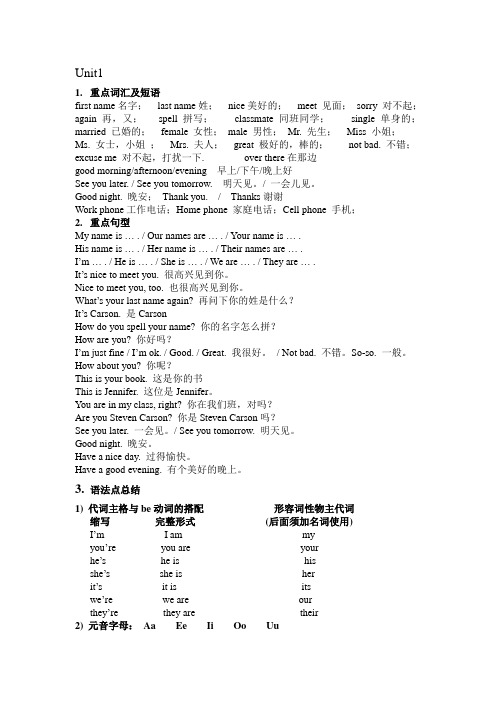
1.重点词汇及短语first name名字;last name姓;nice美好的;meet 见面;sorry 对不起;again 再,又;spell 拼写;classmate同班同学;single 单身的;married 已婚的;female 女性;male 男性;Mr. 先生;Miss 小姐;Ms. 女士,小姐;Mrs. 夫人;great 极好的,棒的;not bad. 不错;excuse me 对不起,打扰一下. over there在那边good morning/afternoon/evening 早上/下午/晚上好See you later. / See you tomorrow. 明天见。
/ 一会儿见。
Good night. 晚安;Thank you. / Thanks谢谢Work phone工作电话;Home phone 家庭电话;Cell phone 手机;2.重点句型My name is … . / Our names are … . / Your name is … .His name is … . / Her name is … . / Their names are … .I’m … . / He is … . / She is … . / We are … . / They are … .It’s nice to meet you. 很高兴见到你。
Nice to meet you, too. 也很高兴见到你。
What’s your last name again? 再问下你的姓是什么?It’s Carson. 是CarsonHow do you spell your name? 你的名字怎么拼?How are you? 你好吗?I’m just fine / I’m ok. / Good. / Great. 我很好。
/ Not bad. 不错。
So-so. 一般。
How about you? 你呢?This is your book. 这是你的书This is Jennifer. 这位是Jennifer。
剑桥国际英语教程1unit1
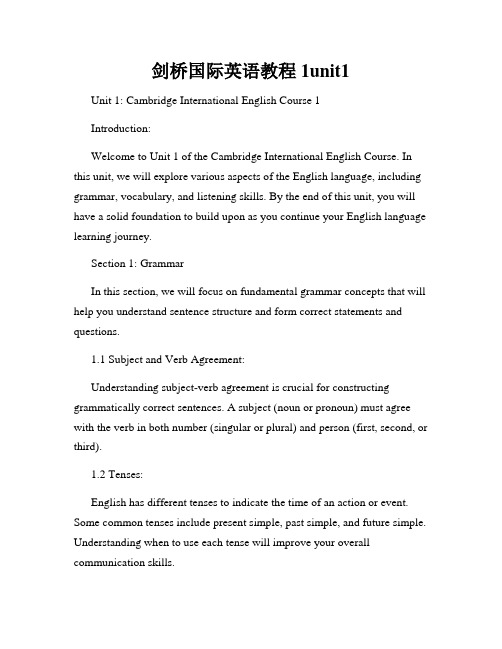
剑桥国际英语教程1unit1Unit 1: Cambridge International English Course 1Introduction:Welcome to Unit 1 of the Cambridge International English Course. In this unit, we will explore various aspects of the English language, including grammar, vocabulary, and listening skills. By the end of this unit, you will have a solid foundation to build upon as you continue your English language learning journey.Section 1: GrammarIn this section, we will focus on fundamental grammar concepts that will help you understand sentence structure and form correct statements and questions.1.1 Subject and Verb Agreement:Understanding subject-verb agreement is crucial for constructing grammatically correct sentences. A subject (noun or pronoun) must agree with the verb in both number (singular or plural) and person (first, second, or third).1.2 Tenses:English has different tenses to indicate the time of an action or event. Some common tenses include present simple, past simple, and future simple. Understanding when to use each tense will improve your overall communication skills.Section 2: VocabularyBuilding your vocabulary is essential for effective communication. In this section, we will explore strategies to expand your word bank and improve your language proficiency.2.1 Word Families:Word families consist of a base word and its related forms (nouns, verbs, adjectives, adverbs). Learning word families helps you understand how words are connected and how their meanings can be extended.2.2 Synonyms and Antonyms:Knowing synonyms (words with similar meanings) and antonyms (words with opposite meanings) allows you to express yourself more precisely and avoid repetition in your speech and writing.Section 3: Listening SkillsDeveloping your listening skills is crucial for engaging in conversations and understanding native speakers. In this section, we will provide strategies to enhance your listening abilities.3.1 Active Listening:Active listening involves focusing on the speaker, paying attention to verbal and nonverbal cues, and understanding the main ideas and supporting details. Practicing active listening will improve your overall comprehension skills.3.2 Note-Taking:Taking notes while listening helps you retain information and review key points later. Develop a system that works for you, whether it's using bullet points, diagrams, or abbreviations.Conclusion:Congratulations on completing Unit 1 of the Cambridge International English Course. By focusing on grammar, vocabulary, and listening skills, you have taken significant steps towards improving your English language proficiency. Remember to practice regularly and apply what you have learned in real-life situations. Good luck on your language learning journey!。
剑桥国际英语教程1unit11单词和句子默写对应版

第十一单元:It’s a very exciting place!Topic: Cities & sights城市和风景词汇:Positive negative1. beautiful 漂亮的2. cheap 便宜的3. clean 干净的4. interesting 有趣的5. quiet 安静的6. relaxing 放松的7. safe 安全的8. spacious有空间的;宽敞的empty adj. 空的9.fantastic adj. 极好的;大得难以置信的;10.busy 繁忙的9.ugly丑陋的10.expensive昂贵的11. polluted污染的12. boring无聊的13. noisy喧嚣的14. stressful有压力的15. dangerous危险的16..Crowded 拥挤的17.Hustle and bustle: 熙熙攘攘18. lifeless 毫无活力的bargain n. 交易,买卖,物美价廉的东西vi. 议价vt. 议价交易beach n. 海滩v. 拖(船)上岸vt. 使船冲上滩crowded adj. 拥挤的definitely adj. 明确地, 确切地adv. 肯定地delicious adj. 可口的, 美味的efficient adj. 效率高的,有能力的event n. 大事, 事件, 项目, 活动extremelyadv. 极其, 非常guide vt.引路;指导;操纵;影响n.指导者;向导;导游;有指导意义的事物harbor n. 海港,避难所vt. 庇护,心怀,窝藏vi. 进入避祸所,生存historical adj. 与历史有关的hometown n. 家乡however adv. 然而conj. 然而, 可是, 不过inexpensive adj. 花费不多的,廉价的information n. 信息, 情报, 新闻, 资料, 询问local a dj. 地方性的,当地的,局部的[计算机] 局部的maybe adv. 大概,也许n. 不确定性nightclub n. 夜总会noisy adj. 喧闹的,嘈杂的n. 嘈杂声,响声outside adv. 在外面n.&adj. 外部prep. 在...外pron. 在...外边pollute v. 弄脏,污染vt. 污染quietn. 安静,闲适,平静adj. 安静的,静止的,宁静的adv. 安静地vt. &vi. 使...平静,使...安心recommend vt. 建议, 推荐, 劝告vt. 使成为可取, 使受欢迎relaxing adj. 轻松的动词relax的现在分词rent n. 租金v. 租vi. 出租vt. 出租,租用scenery n. 布景,风景,背景sight n. 景观, 视力, 眼界vt. 看见, 观看vi. 瞄准somewhat adv.稍微;有点;达到某种程度n.少量;某些数量;某种程度souvenir n. 纪念品stressful adj. 紧张的, 压力重的subway n. 地铁summer adj. 夏季的n. 夏天, 全盛期, 年vi. 度过夏天vt. 在夏天保存或存放, 放(羊/牛) supermarket n. 超级市场taxi n. 计程车,出租汽车v. 用出租车运送,乘计程车,(飞机)滑行though adv. 可是,然而,不过conj. 尽管,虽然prep. 但.ugly adj. 丑陋的, 难看的visitor n. 参观者, 访问者,访客farm:农场Physical work: 体力劳动Healthy: 健康的Current: 当前的definitely: 肯定地;确切地traditional, 传统的ancient: 古代的destination:目的地perform: 表演tango: 探戈舞Ballet: 芭蕾cruise: 巡游foreigner: 外国人birthplace: 诞生地capital: 首都suburb: 郊外canal: 运河castle: 城堡And: 表连接But: 表转折However: 表转折Though: 表转折fantastic=terrific=wonderful: 棒极了rather相反,pretty十分maybe也许,quite相当somewhat有些Adj.+ly 构成Slowly慢慢地Quickly很快Extremely极其Really真的Fairly相当Deeply深深fantastic:棒极了Reasonable合理的Fairly big: 相当大的Sound+adj.: 听起来Plan a trip:计划旅游Really nice真的很不错Fairly big相当大的Very expensive非常昂贵的Too noisy太吵了Pretty busy很忙Somewhat deep有点深Extremely large非常大的One of…: …之一So far: 到目前为止be crowded with: 充满... ...Carnaval狂欢节(巴西)Ginza Shopping District 南京路购物街(上海)Hollywood Walk of Fame好莱坞星光大道The Tour de France 环法自行车赛Bund: (上海)外滩Buenos Aires: 布宜诺斯艾利斯(阿根廷首都)Calle Florida: 弗罗里达街(服装饰品商店较为集中的地方)Tigre: 老虎洲Parana River delta:阿根廷巴拉那三角洲National Museum: 国家博物馆Palace of Fine Arts: 艺术宫Pyramid of the Sun: 太阳神金字塔Prague: 布拉格cultural event: 文化事件Dragon Boat Festival: 端午节San juan, Puerto Rico. 胡胜安,波多黎各句型:1.这个城市怎么样?What is the city like?城市怎么样?How is the city?那是一个有趣的地方吗?Is it an interesting place?我从来没有去过那里。
剑桥国际英语教程重点句子
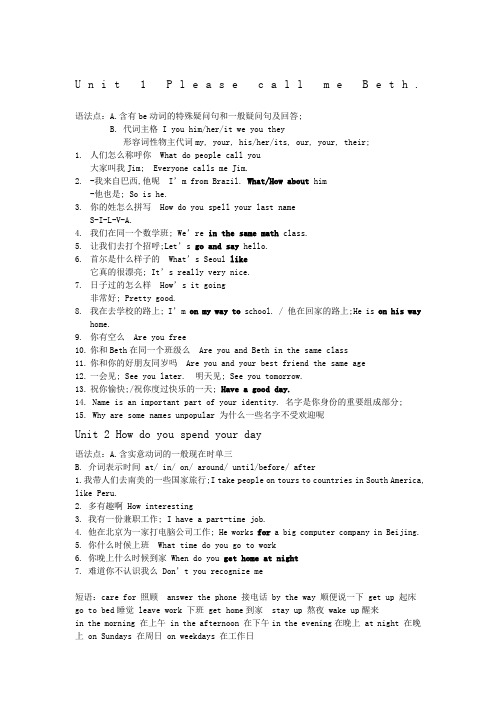
U n i t1P l e a s e c a l l m e B e t h.语法点:A.含有be动词的特殊疑问句和一般疑问句及回答;B. 代词主格 I you him/her/it we you they形容词性物主代词my, your, his/her/its, our, your, their;1.人们怎么称呼你 What do people call you大家叫我Jim; Everyone calls me Jim.2.-我来自巴西,他呢I’m from Brazil. What/How about him-他也是; So is he.3.你的姓怎么拼写 How do you spell your last nameS-I-L-V-A.4.我们在同一个数学班; We’re in the same math class.5.让我们去打个招呼;Let’s go and say hello.6.首尔是什么样子的What’s Seoul like它真的很漂亮; It’s really very nice.7.日子过的怎么样How’s it going非常好; Pretty good.8.我在去学校的路上; I’m on my way to school. / 他在回家的路上;He is on his wayhome.9.你有空么 Are you free10.你和Beth在同一个班级么 Are you and Beth in the same class11.你和你的好朋友同岁吗 Are you and your best friend the same age12.一会见; See you later. 明天见; See you tomorrow.13.祝你愉快;/祝你度过快乐的一天; Have a good day.14. Name is an important part of your identity. 名字是你身份的重要组成部分;15. Why are some names unpopular 为什么一些名字不受欢迎呢Unit 2 How do you spend your day语法点:A.含实意动词的一般现在时单三B. 介词表示时间 at/ in/ on/ around/ until/before/ after1.我带人们去南美的一些国家旅行;I take people on tours to countries in South America, like Peru.2. 多有趣啊 How interesting3. 我有一份兼职工作; I have a part-time job.4. 他在北京为一家打电脑公司工作; He works for a big computer company in Beijing.5. 你什么时候上班 What time do you go to work6. 你晚上什么时候到家 When do you get home at night7. 难道你不认识我么Don’t you recognize me短语:care for 照顾 answer the phone 接电话 by the way 顺便说一下 get up 起床go to bed睡觉 leave work 下班 get home到家 stay up 熬夜 wake up醒来in the morning 在上午 in the afternoon 在下午in the evening在晚上 at night 在晚上 on Sundays 在周日 on weekdays 在工作日Unit 3 How much is it语法点:A. 指示代词this/that/these/those/one/onesB. How much/which引导的特殊疑问词C.形容词的比较级1.他们很配你;They are perfect for you.2.它多少钱 How much is it3.让我买给你;Let me get it for you.4.我喜欢那边的那个背包;I like that backpack over there.5.你比较喜欢哪一个 Which one do you prefer我比较喜欢羊毛的那件;I like the wool one better.6.他看上去比较暖和;It looks warmer.7.它比羊毛的那件更时髦;It’s more stylish than the wool one.8.没有价签;There’s no price tag.9.你想要试穿它吗Would you like to try it on10.仍然很感谢你;Thanks anyway.Unit 4 Do you like rap语法点:A. 含有实意动词的一般现在时一般疑问句、特殊疑问句B.What kind问句C. 代词宾格D.动词:would like to do/want to do/have to do1.我不太喜欢说唱音乐; I don’t like rap very much.2.我是Michael Jackson的超级歌迷;I’m a big fan of Michael Jackson.3.他弹钢琴吗 Does he play the piano4.我想我对说唱音乐知道不多;I guess I don’t know much about rap.5.你喜欢那种音乐 What kind of music do you like6.谁是你最喜欢的歌手 Who is your favorite singer7.你演奏什么乐器 What musical instrument do you play8.-我有周五晚上球赛的票;你想去么 -我想去,什么时候开始—I have tickets to the soccer match on Friday night. Would you like to go ——I’d love to. What time does it start—9.你想六点时去吃饭吗 Do you want to have dinner at 6:0010.我不得不工作到很晚;I have to work late.11.让我们比赛前,大约7点半在大门见;Let’s meet at the gate before the match, around 7:30.Unit 5 Tell me about your family.语法点:A. 现在进行时肯定、否定、疑问、特殊疑问 what where whoB. 量词 all/nearly all/most/many/a lot of/some/not many/a few/few/C. 代词 no one/anyone1. 告诉我你家的情况;讲讲你的家庭情况;Tell me about your family.2. 我姐姐为政府工作; My sister works for the government.3. 她是做什么的 What does she do我不确定; I’m not sure.4. 她现在正在忙一个秘密项目; She’s working on a secret project right now.5. 多么有趣的家庭啊 What an interesting family6. 你哥哥现在在做什么 What is your brother doing these days7. 现在你家有人在旅行么 Is anyone in your family traveling right now8. 你有几个兄弟姐妹 How many brothers and sisters do you have9.我是独生子女; I’m an only child.10. 如今在中国大多数家庭只有一个孩子;Most families in China have only one child nowadays.11.现在许多家庭都比较小; A lot of families are smaller these days.12. 大家庭很棒,因为你可以得到很多生日礼物;Big families are great because you get lots of birthday presents.14.在日本,50%的女人22岁之前就结婚了;In Japan, 50% of women get married by the age of 22.15.27%的18-34岁的成年人和父母住在一起;27% adults between the ages of 18-34 livewith their parents.Unit 6 How often do you exercise语法点: A.频率副词 always/almost always/usually/often/sometimes/hardlyever/almost never/neverB. 特殊疑问句:How often/How long/How well/How good1.I almost always get up early, and I lift weight for an hour.我几乎总是早起,举重一小时;2.How often do you exercise like that 你像那样锻炼多久一次About five times a week.大约一周五次;3.I hardly ever exercise. I usually just watch TV in my free time.我几乎不锻炼;我经常只是在闲暇时看电视;4.What do you usually do on Saturday morning 你周六上午通常做什么Nothing much. I almost always sleep until noon.不做什么;我几乎总是一直睡到中午;5.That sounds like a lot of fun. 那听上去很有趣;6.-How well do you play -Pretty well. About average. Not very well.你玩得怎么样非常好;一般; 不太好;7.I will give you a few tips.我将会给你一些建议;8.How long do you spend at the gym 你在健身房花多长时间9.How good are you at sports Pretty good. Not so good.你运动方面怎么样很好;不太好;10.我擅长数学;I’m good at math.11.It’s a good way to relax.是个放松的好办法;短语:go jogging去慢跑 go skating去滑冰take long walks 远足Keep fit 保持健康in great shape处于良好状态 fitness freak健身迷 work out锻炼 on weekends 在周末play cards打牌。
[VIP专享]剑桥国际英语interchange1Unit1-6 重点总结
![[VIP专享]剑桥国际英语interchange1Unit1-6 重点总结](https://img.taocdn.com/s3/m/23f555f3af1ffc4fff47ac63.png)
2.161.I’m not afraid of working under pressure .2.There has been a marked increase in trade between the two countries .3.Don’t distract me .I’m trying to concentrate on my studying .4.You should pay me extra money for the extra work .don’t try to trick me5.To tell you the truth ,your plan is very attractive ,but it doesn’t seem to be practical .2.231.I think my greatest strengths are details-oriental organized and communication .(punctual aggressive )2.I am perfectionist and i pay very much attention to details .3.This is not only a fine opportunity ,but this company is a place where my qualifications (certification)can make a difference .4.I love my last job and really learned a lot from it .but i need a new platform and bigger space to make my career successful .5.I’ve learned from each boss I’ve had .Form the good ones ,what to do ;form the challenging ones ,what not to do .3.21.Mature ,self-motivated and strong interpersonal skills .2.Energetic ,fashion -minded person .3.With a pleasant mature attitude .4.Strong determination to succeed.5.Strong leadership skills .6.Ability to work well with others .7.Be highly organized and efficient .8.Willing to learn and progress .9.Good presentation skills .10.Reliable person with excellent health and pleasant personality .剑桥国际英语interchange1重点总结Unit 1-5Unit 11.So is Sylvia . Sylvia 也是2.How do you spell that ?3.Introduce yourself with your full name.4.My parents are on vacation this week.5.How is it going?6.Pretty good .7.I’m on my way to the cafeteria now .8.Is Ms Gray from the United States ?9.Have a good day .10.When you think of yourself ,you probably think of your name .11.It is an important part of your identity .s can become popular because of famous actors .13.Surprisingly ,people generally agree on the way they feel about names14.Here are some common opinions about names from names from arecent survey .15.According to the article .Unit 21.I have a part-time job .2.How do you like your classes?3.What does he do ,exactly ?4.Don’t use you partner’s name on the paper; use he or she instead .5.Don’t you recognize me ?6.By the way7.Who do you think has the best daily schedule ?8.I don’t have any experience,but I can learn quickly .9.He makes a good salary .10.I don’t get an allowance from my parents anymore.11.I need to earn money.Unit31.sources: Based on information2.What does your favorite color make you think of .3.They’re perfect for you .4.What else do they buy ? Who pays for it ?5.Are you kidding .6.That’s reasonable7.It’s more stylish than the woolen one .8.There’s no price tag .9.Would you like to try it on ?10.But thanks anyway11. How much do these things cost in your country ?12.For example a newspaper costs one dollar at home .13.But whether you like it or not, eBay is here to stay .14.Soon ,people may be able to shop on eBay anywhere in the world .15.Check Fact or Opinion16.Have you ever shopped online ?17.If so ,how was your experience?Unit 4plete the word map with words from the list2.I’m a big fan of liminhao.3.What kind of music do you like ?4.Who is you favorite singer ?5.Do you play a musical instrument ?6.Would you like to go ?7.I’d love to .8.That sounds great .9.I have to work late .10.Would you like to come over for dinner tomorrow night .11.Would you like to go a pop concert with me this weekend .12.Ask and answer the question ,give your own responses .13.Text message abbreviations14.In what year did each event take place ?15.So far she has multiple hit singles .16.Overall ,Sylvia is thrilled by her success .Unit 51.How are these people related to him ?2.Then take turns talking .3.Ask follow-up questions to get more information .4.For a single person .5.Tell me about your brother .6.My sister works for the government .7.What dose she do ?8.I’m not sure .9.She is working on a very secret project right now .10.Practice the conversation11.Pay attention to the intonation in the statements .Practice makes perfect.Great minds think alike .12.I’m standing in an elevator ,and it’s stuck.13.How are you and Baron enjoying your shopping trip ?14.We are have a lot of fun .15.Is your brother spend a lot of money ?16.studying a foreign language17.Find out about your classmates’families .18.typical families19.which facts seem like positive things ?which seem negative ?20.Do you agree ?21.Actually, I’m a only child .22.Most families in China have only one child nowadays .23.Listen to the rest of the conversation .24.Then compare with a partner .25.Thirty-five percent of the people in Germany live alone .26.Rewrite the sentences in part A so that they are true about your country .27.This year Baron is working again as a hospital administrator .28.Everything is going well,but there are also some problems .29.When Sylvia comes to pick her up ,she doesn’t want to leave .30.Unfortunately31.He’s also doing a few household chores .32.Which do you think is the most serious ?33.Offer some solutions for that problem .Unit 61.The pop five sports and fitness activities2.Make a list of other sports or activities you do .3.Always ; almost always ;usually ;often ;sometimes ;hardly ever;almost never4.Take a poll in you group .5.You’re in great shape .6.I’m a real fitness freak .7.How well do you play ?8.I’ll give you a few tips .9.Pretty well ;about average ;not very well10.Take the quiz and add up you score .。
剑桥国际英语interchange1Unit2 How do you spend you day重点总结

剑桥国际英语interchange1重点总结Unit 2How do you spend you day?1、单词salary['sælərɪ] n. 薪水vt. 给...加薪;给...薪水condition[kən'dɪʃ(ə)n] n. 条件;情况;环境;身份vt. 决定;使适应;使健康;以…为条件security[sɪ'kjʊərətɪ] n. 安全;保证;证券;抵押品adj. 安全的;保安的;保密的fisherman['fɪʃəmən] n. 渔夫;渔人cowboy['kaʊbɒɪ] n. 牛仔;牧童;莽撞的人construction[kən'strʌkʃ(ə)n] n. 建设;建筑物;解释;造句lumberjack['lʌmbədʒæk] n. 伐木工人;木材商的佣工;短茄克衫definitive[dɪ'fɪnɪtɪv] n. 限定词adj. 决定性的;最后的;限定的cashier[kæ'ʃɪə; kə-] n. 出纳员;司库;收银员vt. 解雇;抛弃chef[ʃef] n. 厨师,大师傅musician [mjuː'zɪʃ(ə)n] n. 音乐家pilot['paɪlət] n. 飞行员;领航员adj. 试点的v. 驾驶;领航;试用receptionist[rɪ'sepʃ(ə)nɪst] n. 接待员;传达员server['sɜːvə] n. 发球员;服伺者;服勤者;伺候者administration[ədmɪnɪ'streɪʃ(ə)n] n. 管理;行政;实施;行政机构marketing['mɑːkɪtɪŋ] n. 行销,销售v. 出售;在市场上进行交易;使…上市HR-Human Resources人力资源R&D research and development研发部cook[kʊk] n. 厨师,厨子vt. 烹调,煮vi. 烹调,做菜cooker['kʊkə] n. 炊具;烹饪用水果;窜改waiter['weɪtə] n. 服务员,侍者column['kɒləm] n. 纵队,列;专栏;圆柱,柱形物patient['peɪʃ(ə)nt] n. 病人;患者adj. 有耐性的,能容忍的salesperson['seɪlzpɜːs(ə)n] n. 售货员airplane['eəpleɪn] n. 飞机airport['eəpɔːt] n. 机场;航空站carpenter['kɑːp(ə)ntə] n. 木匠,木工vt. 制作vi. 当木匠,做木匠工作restaurant['restrɒnt] n. 餐馆;[经] 饭店snack[snæk] n. 小吃,快餐;一份,部分vi. 吃快餐,吃点心violin[vaɪə'lɪn; 'vaɪəlɪn] n. 小提琴;小提琴手fantastic fæn'tæstɪk] n. 古怪的adj. 奇异的;空想的;异想天开的;古怪的;极好的,极出色的;不可思议的;不切实际的operation[ɒpə'reɪʃ(ə)n] n. 操作;经营;[外科] 手术;[数][计] 运算biography[baɪ'ɒgrəfɪ] n. 传记;档案;个人简介exactly[ɪg'zæk(t)lɪ; eg-] adv. 恰好地;正是;精确地;正确地announcer[ə'naʊnsə] n. [广播] 广播员;宣告者schedule['ʃedjuːl; 'sked-] n. 时间表;计划表vt. 安排,计划;编制目录;将…列入计划表type[taɪp] n. 类型,品种;模范;样式vt. 打字;测定(血等)类型vi. 打字allowance[ə'laʊəns] n. 津贴,零用钱;允许;限额vt. 定量供应recognize['rekəɡnaɪz] vt. 认出,识别;承认vi. 确认,承认;具结Monday['mʌndeɪ] n. 星期一Tuesday['tjuːzdeɪ; -dɪ] n. 星期二Wednesday['wenzdeɪ; -dɪ] n. 星期三Thursday['θɜːzdeɪ; -dɪ] n. 星期四Friday['fraidi] n. 星期五Saturday['sætədɪ; -de] n. 星期六Sunday['sʌndeɪ] n. 星期日;礼拜日January['dʒænjʊ(ə)rɪ] n. 一月February['febrʊərɪ; 'febjʊərɪ] n. 二月March[mɑːtʃ] n. 三月April ['eɪprəl] n. 四月May [meɪ] n. 五月June [dʒu:n] n. 六月July[dʒʊˈlaɪ] n. 七月August [ɔ:ˈgʌst] n. 八月September [sep'tembə] n. 九月October [ɒk'təʊbə] n. [天] 十月November [nə(ʊ)'vembə] n. 十一月December[dɪ'sembə] n. 十二月2、词组、句子What do you do ?How interesting!part-time job兼职tour guide导游Web-site designer网站设计师sales rep推销员,销售代表company director公司董事长flight attendant空中服务人员;空中乘务员bus station n. 公交车站air hostess空姐hotel manager酒店经理train station火车站go to school去上学by the way顺便说说stay up熬夜on weekdays在工作日on weekends在周末department store 百货商店entertainment business娱乐业travel industry旅游业weather report天气预报。
剑桥国际英语教程重点句子
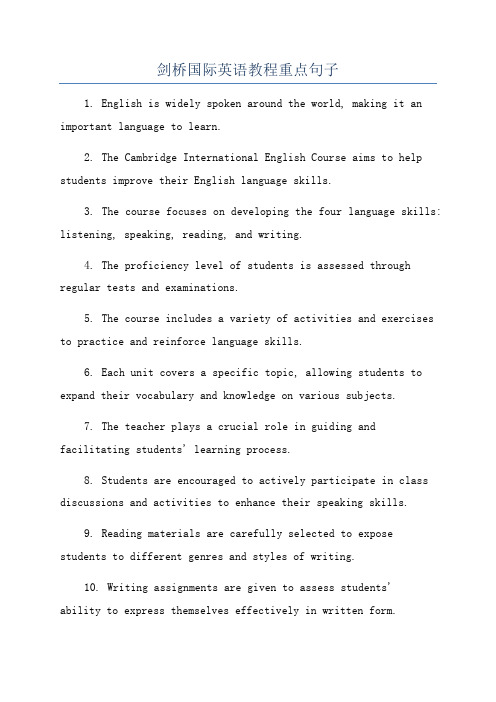
剑桥国际英语教程重点句子1. English is widely spoken around the world, making it an important language to learn.2. The Cambridge International English Course aims to help students improve their English language skills.3. The course focuses on developing the four language skills: listening, speaking, reading, and writing.4. The proficiency level of students is assessed through regular tests and examinations.5. The course includes a variety of activities and exercises to practice and reinforce language skills.6. Each unit covers a specific topic, allowing students to expand their vocabulary and knowledge on various subjects.7. The teacher plays a crucial role in guiding andfacilitating students' learning process.8. Students are encouraged to actively participate in class discussions and activities to enhance their speaking skills.9. Reading materials are carefully selected to expose students to different genres and styles of writing.10. Writing assignments are given to assess students'ability to express themselves effectively in written form.13. Grammar exercises are integrated into the course to enhance students' understanding and usage of English grammar rules.14. Vocabulary acquisition is emphasized through the use of word lists, flashcards, and contextual learning activities.15. The course aims to develop students' confidence and fluency in using English in real-life situations.。
Interchange0 剑桥国际英语教程
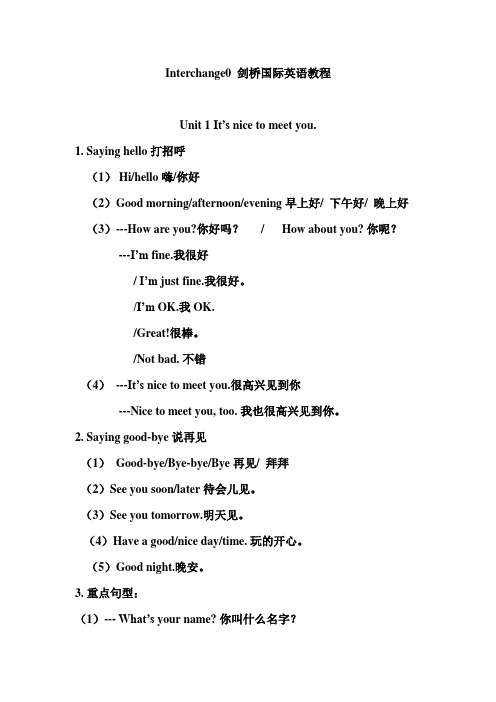
Interchange0 剑桥国际英语教程Unit 1 It’s nice to meet you.1. Saying hello打招呼(1) Hi/hello嗨/你好(2)Good morning/afternoon/evening 早上好/ 下午好/ 晚上好(3)---How are you?你好吗?/ How about you? 你呢?---I’m fine.我很好/ I’m just fine.我很好。
/I’m OK.我OK./Great!很棒。
/Not bad. 不错(4) ---It’s nice to meet you.很高兴见到你---Nice to meet you, too. 我也很高兴见到你。
2. Saying good-bye说再见(1) Good-bye/Bye-bye/Bye 再见/ 拜拜(2)See you soon/later待会儿见。
(3)See you tomorrow.明天见。
(4)Have a good/nice day/time. 玩的开心。
(5)Good night.晚安。
3. 重点句型:(1)--- What’s your name? 你叫什么名字?-----My name is Maria. (I’m Maria)我叫玛利亚。
(2)--- Are you Maria?你是玛利亚吗?---- Yes. I am.是的/ No, I’m not.不是(3)His name is Michael.他叫麦克Her name is Nicole.她叫Nicole。
They are Michael and Nicole.他们叫Michael and Nicole(4)--- What’s your cell phone number?你的电话号码是多少?--(It’s)2602200.(5)--- What’s your e-mail address? 你的邮件地址是什么啊?---983359352@(6)----How do you spell your name? 你的姓怎么拼写?----C-i-n-d-y.Unit 2 What’s this?这是什么?1. Key words关键词camera 照相机keys 钥匙cell phone手机wallet钱包sunglasses太阳镜hairbrush梳子address book地址簿CD player CD播放机briefcase公文包clock闹钟newspaper报纸purse女士手提包television电视机ticket门票stamp邮票watch手表umbrella雨伞notebook笔记本earrings耳环2. 方位介词in在...里面 in front of在...前面 behind在...后面on在...上面 next to在...旁边 under在...下面3. 重点句型:(1). This is a book. 这是一本书。
- 1、下载文档前请自行甄别文档内容的完整性,平台不提供额外的编辑、内容补充、找答案等附加服务。
- 2、"仅部分预览"的文档,不可在线预览部分如存在完整性等问题,可反馈申请退款(可完整预览的文档不适用该条件!)。
- 3、如文档侵犯您的权益,请联系客服反馈,我们会尽快为您处理(人工客服工作时间:9:00-18:30)。
U n i t1P l e a s e c a l l m e B e t h. 语法点:A.含有be动词的特殊疑问句和一般疑问句及回答。
B. 代词主格 (I you him/her/it we you they)形容词性物主代词(my, your, his/her/its, our, your, their)。
1.人们怎么称呼你? What do people call you?大家叫我Jim。
Everyone calls me Jim.2.-我来自巴西,他呢?I’m from Brazil. What/How about him?-他也是。
So is he.3.你的姓怎么拼写? How do you spell your last name?S-I-L-V-A.4.我们在同一个数学班。
We’re in the same math class.5.让我们去打个招呼。
Let’s go and say hello.6.首尔是什么样子的?What’s Seoul like?它真的很漂亮。
It’s really very nice.7.日子过的怎么样?How’s it going?非常好。
Pretty good.8.我在去学校的路上。
I’m on my way to school. / 他在回家的路上。
He is on his way home.9.你有空么? Are you free?10.你和Beth在同一个班级么? Are you and Beth in the same class?11.你和你的好朋友同岁吗? Are you and your best friend the sameage?12.一会见。
See you later. 明天见。
See you tomorrow.13.祝你愉快。
/祝你度过快乐的一天。
Have a good day.*14. Name is an important part of your identity. 名字是你身份的重要组成部分。
*15. Why are some names unpopular? 为什么一些名字不受欢迎呢?Unit 2 How do you spend your day?语法点:A.含实意动词的一般现在时(单三)B. 介词(表示时间 at/ in/ on/ around/ until/before/ after)1.我带人们去南美的一些国家旅行。
I take people on tours to countries in South America, like Peru.2. 多有趣啊! How interesting!3. 我有一份兼职工作。
I have a part-time job.4. 他在北京为一家打电脑公司工作。
He works for a big computer company in Beijing.5. 你什么时候上班? What time do you go to work?6. 你晚上什么时候到家?When do you get home at night?7. 难道你不认识我么?Don’t you recognize me ?短语:care for 照顾 answer the phone 接电话 by the way 顺便说一下get up 起床go to bed睡觉 leave work 下班 get home到家 stay up 熬夜 wake up醒来in the morning 在上午 in the afternoon 在下午in the evening在晚上at night 在晚上 on Sundays 在周日 on weekdays 在工作日Unit 3 How much is it?语法点:A. 指示代词this/that/these/those/one/onesB. How much/which引导的特殊疑问词C.形容词的比较级1.他们很配你。
They are perfect for you.2.它多少钱?How much is it?3.让我买给你。
Let me get it for you.4.我喜欢那边的那个背包。
I like that backpack over there.5.你比较喜欢哪一个? Which one do you prefer?我比较喜欢羊毛的那件。
I like the wool one better.6.他看上去比较暖和。
It looks warmer.7.它比羊毛的那件更时髦。
It’s more stylish than the wool one.8.没有价签。
There’s no price tag.9.你想要试穿它吗?Would you like to try it on?10.仍然很感谢你。
Thanks anyway.Unit 4 Do you like rap?语法点:A. 含有实意动词的一般现在时(一般疑问句、特殊疑问句)B.What kind问句C. 代词宾格D.动词:would like to do/want to do/have to do1.我不太喜欢说唱音乐。
I don’t like rap very much.2.我是Michael Jackson的超级歌迷。
I’m a big fan of Michael Jackson.3.他弹钢琴吗? Does he play the piano?4.我想我对说唱音乐知道不多。
I guess I don’t know much about rap.5.你喜欢那种音乐? What kind of music do you like?6.谁是你最喜欢的歌手? Who is your favorite singer?7.你演奏什么乐器?What musical instrument do you play?8.-我有周五晚上球赛的票。
你想去么? -我想去,什么时候开始?—I have tickets to the soccer match on Friday night. Would you like to go?—I’d love to. What time does it start?9.你想六点时去吃饭吗?Do you want to have dinner at 6:00?10.我不得不工作到很晚。
I have to work late.11.让我们比赛前,大约7点半在大门见。
Let’s meet at the gate before the match, around 7:30.Unit 5 Tell me about your family.语法点:A. 现在进行时(肯定、否定、疑问、特殊疑问 what where who) B. 量词 all/nearly all/most/many/a lot of/some/not many/a few/few/C. 代词 no one/anyone1. 告诉我你家的情况。
(讲讲你的家庭情况)。
Tell me about your family.2. 我姐姐为政府工作。
My sister works for the government.3. 她是做什么的? What does she do?我不确定。
I’m not sure.4. 她现在正在忙一个秘密项目。
She’s working on a secret project right now.5. 多么有趣的家庭啊! What an interesting family!6. 你哥哥现在在做什么? What is your brother doing these days?7. 现在你家有人在旅行么? Is anyone in your family traveling right now?8. 你有几个兄弟姐妹? How many brothers and sisters do you have?9.我是独生子女。
I’m an only child.10. 如今在中国大多数家庭只有一个孩子。
Most families in China have only one child nowadays.11.现在许多家庭都比较小。
A lot of families are smaller these days.12. 大家庭很棒,因为你可以得到很多生日礼物。
Big families are great because you get lots of birthday presents.14.在日本,50%的女人22岁之前就结婚了。
In Japan, 50% of women get married by the age of 22.15.27%的18-34岁的成年人和父母住在一起。
27% adults between theages of 18-34 live with their parents.Unit 6 How often do you exercise?语法点: A.频率副词always/almost always/usually/often/sometimes/hardly ever/almost never/neverB. 特殊疑问句:How often/How long/How well/How good1.I almost always get up early, and I lift weight for an hour.我几乎总是早起,举重一小时。
2.How often do you exercise like that? 你像那样锻炼多久一次?About five times a week.大约一周五次。
3.I hardly ever exercise. I usually just watch TV in my free time.我几乎不锻炼。
我经常只是在闲暇时看电视。
4.What do you usually do on Saturday morning? 你周六上午通常做什么?Nothing much. I almost always sleep until noon.不做什么。
我几乎总是一直睡到中午。
5.That sounds like a lot of fun. 那听上去很有趣。
6.-How well do you play? -Pretty well. About average. Not very well.你玩得怎么样?非常好。
一般。
不太好。
7.I will give you a few tips.我将会给你一些建议。
